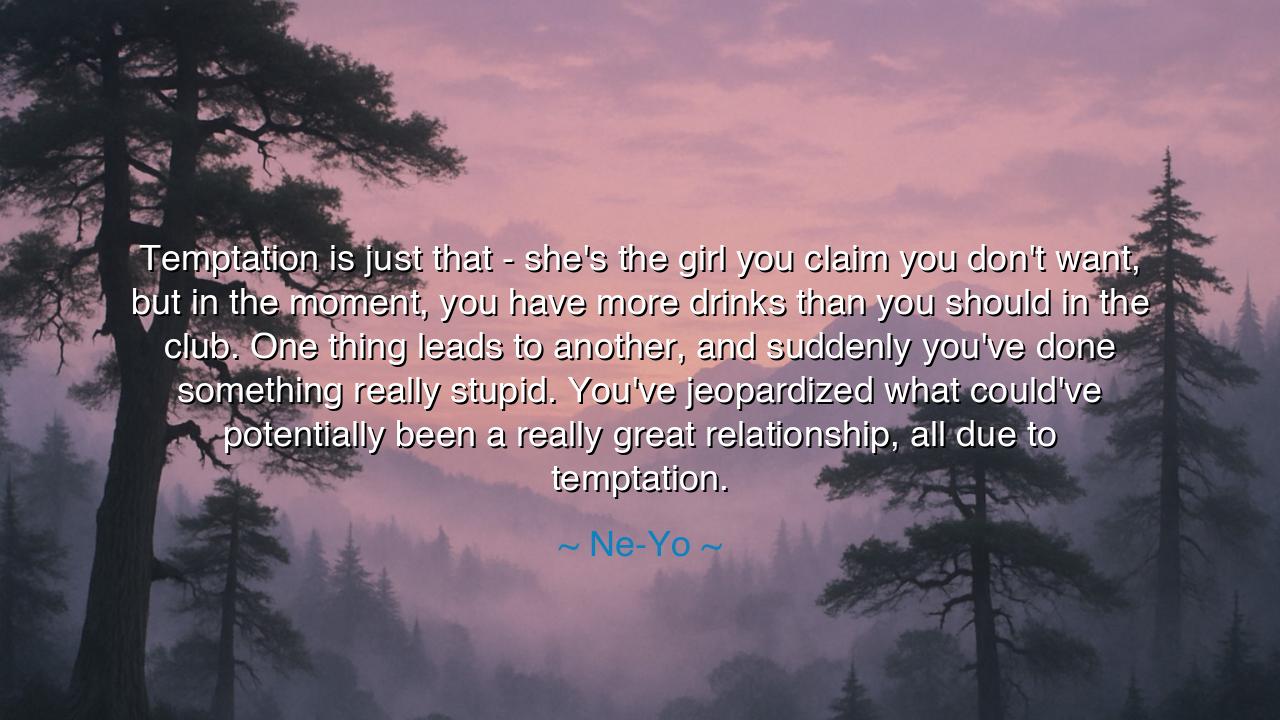
Temptation is just that - she's the girl you claim you don't
Temptation is just that - she's the girl you claim you don't want, but in the moment, you have more drinks than you should in the club. One thing leads to another, and suddenly you've done something really stupid. You've jeopardized what could've potentially been a really great relationship, all due to temptation.






Hear the warning of Ne-Yo, who speaks with the candor of experience: “Temptation is just that—she’s the girl you claim you don’t want, but in the moment, you have more drinks than you should in the club. One thing leads to another, and suddenly you’ve done something really stupid. You’ve jeopardized what could’ve potentially been a really great relationship, all due to temptation.” In this vivid image he reveals the ancient struggle between desire and discipline, between fleeting pleasure and lasting bond.
He names temptation as a seductress, alluring yet destructive, who approaches when the guard of reason is lowered. Though the mind declares, “I do not want her,” the weakened will falters when clouded by indulgence. So it has ever been: the path to folly is rarely planned, but stumbled into, one small choice leading swiftly to ruin.
The cost, he reminds us, is the loss of a relationship that might have been great. For a single night of weakness can unravel the trust built over years. Like fire in a dry field, temptation consumes quickly what was slow to grow. This is the true tragedy—that a moment of blindness endangers a future of promise.
Thus, Ne-Yo’s teaching is this: guard thyself in moments of weakness, for they are the doorway through which temptation enters. Do not mistake her for harmless, nor trust yourself too greatly in her presence. The ancients too warned that discipline is the shield of love, and without it, even the strongest bonds are broken.
Therefore, O seekers, remember: fleeting indulgence is never worth the lasting wound. To resist temptation is to preserve not only honor, but the sacred gift of true love. In this lesson Ne-Yo joins the chorus of sages, reminding us that passion without wisdom leads only to loss. Would you like me to render this as a parable of the banquet hall, where temptation appears as a guest who ruins the feast of love?






TNLe trong nghia
Ne-Yo’s quote brings up an important point about how fleeting temptations can impact long-term goals. But how often do we blame temptation for the decisions we make, when in reality, it’s our lack of foresight or self-awareness? How do we learn to think ahead in moments where we feel impulsive or caught in the moment? And do we always regret acting on temptation, or are there times when it might not be so harmful?
UGUser Google
I think Ne-Yo's quote captures the complexity of temptation in relationships. The moment of temptation might feel exciting or validating, but as soon as the consequences hit, the excitement fades. How do we prevent ourselves from falling into the trap of instant gratification when we know it could jeopardize something meaningful? Is it about building stronger self-awareness, or are there deeper emotional needs that need to be addressed first?
NPNguyen Phong
Ne-Yo’s perspective on temptation speaks to the vulnerability we all face when we act without thinking. It’s fascinating how one bad decision can change everything. But what’s really at play here? Is it a lack of self-control, or do we just not think about the long-term consequences? How do we balance the thrill of living in the moment with the responsibility of not ruining something that could be great?
LQPham Le Quyen
This quote really makes me reflect on how temptation can cloud our judgment in the heat of the moment. It’s easy to convince ourselves that we’re not really interested in something, but then our actions tell a different story. How do we build the self-discipline to resist temptation when we’re in situations that encourage us to act impulsively? Can we learn to avoid these situations altogether, or is temptation just part of life?
QTQuoc Truong
Ne-Yo’s quote about temptation touches on something many of us have experienced: the impulse to act on desire in the moment and then regret it afterward. It makes me wonder—how often do we let fleeting moments of temptation impact long-term goals or relationships? Is the temporary satisfaction worth the consequences? And how do we learn to control those impulses to avoid sabotaging something meaningful?